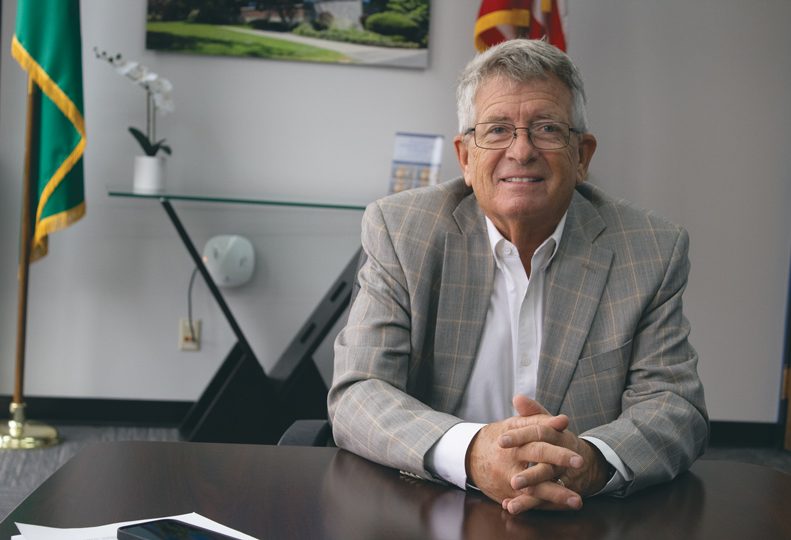
Home » Retirees find fulfillment serving on boards
Retirees find fulfillment serving on boards
Former business leaders bring knowledge, perspective to different organizations

Retired Providence CEO Mike Wilson held various leadership positions with the Inland Northwest's largest health care system over the course of nearly 30 years.
| Dylan HarrisSeptember 26, 2024
For some former leaders in the Spokane community, retirement consists of more than traveling the world and perfecting a backswing.
The newfound spare time presents an opportunity for retirees to bestow their years of experience on various organizations’ boards.
“If you retire and you do nothing, if you void yourself from the intellectual and community-based things that you’ve always done, you’re going to be really bored,” says Mike Wilson, the former CEO of Providence’s Inland Northwest region, who retired about a decade ago.
Since his retirement, Wilson has served on boards for Health Sciences & Services Authority of Spokane County; Group Health Cooperative, and later Kaiser Permanente after it acquired Group Health; the University of Washington-Gonzaga University Health Partnership; Catholic Charities; Community Colleges of Spokane; and the Washington State Opportunity Scholarship.
Wilson still serves on the Kaiser Permanente, Catholic Charities, and Washington State Opportunity Scholarship boards.
“If you’re not continuing to be invigorated by your activities that historically you have really enjoyed, I think you should make an effort to get involved and to continue the influence that you have,” Wilson says.
Serving on boards is also a way to give back, says former chancellor and CEO of Community Colleges of Spokane Christine Johnson, who retired at the end of 2022.
“I want to do my part,” Johnson says. “With my passion for education and knowing what a difference it makes in the lives of the individuals and society, whatever I can do from experience or my knowledge, I am very happy to share.”
Johnson currently serves on the Eastern Washington University, Gonzaga University, and Washington STEM boards, and is also on the Greater Spokane Incorporated economic development committee.
Johnson’s desire to serve comes from witnessing others do the same for her and the institutions she worked for throughout her career.
“As I grew up and followed my career, there were always people who were ready to step in to help in any way,” she says.
The Spokane region is rife with leaders who collaborate to serve the community at large, Johnson says, and it’s something she wants to see continue.
“Spokane has a really wonderful culture of both business and civic leadership working together to make our region better,” Johnson says. “Our region invites that, invites people who want to share ideas and the commitment to our shared prosperity.”
For Greg Bever, the former publisher of the Journal of Business, serving on boards allows him to stay engaged with the Spokane business community, something he prioritized during his 43-year career in the newspaper industry.
“I’ve always been really involved in the community,” says Bever, who retired in 2012. “That comes with the territory of being the publisher of the Journal of Business, because you want to take the pulse of the community and know what’s going on.”
During his retirement, Bever has served on boards for AAA Washington, Community Colleges of Spokane, the Inland Northwest Council of Boy Scouts of America, and the Association of Community College Trustees for Washington state. He also served on the marketing committee for Innovia Foundation.
“Most of that is because you want to continue to give back to your community and continue to be involved in what’s going on in the Spokane marketplace,” Bever says. “I’ve really enjoyed staying engaged.”
Bever currently isn’t serving on any boards, although he would be open to doing so if an opportunity arises, he says.
Johnson says it’s important for boards to include a broad range of people who bring different experiences and areas of expertise to the table.
“Over the years, one acquires knowledge in their field and experience just managing or leading organizations, whether they’re small or big,” she says. “Every organization, to be successful, has to have a good leader.”
Depending on the board, Wilson says board members typically meet either monthly or quarterly—sometimes more, like with the Community Colleges of Spokane, which has more events that board members attend.
The board meeting schedules have kept him busy throughout his retirement, he says, but it doesn't compare to the demand of the roughly 14-hour days he was regularly putting in at Providence.
“I thoroughly enjoy it," Wilson says. "I try to be as engaged as I can possibly be in what goes on within those organizations."
While the experience of retirees is something organizations should take advantage of, Wilson says it’s important to have younger people on boards too.
“Ultimately, as retirement extends out, you become less contemporary,” Wilson explains. “Pretty soon, your connections within the community are not as significant, because the younger people have begun to take over the leadership of the community and the organizations.”
Wilson says he plans on serving on the Catholic Charities and Kaiser boards for a long time, but doesn’t expect to take on any new board positions.
“Your experience is always helpful, but I think you have to recognize when the younger generation should really be taking on the roles that you’ve been taking on,” Wilson says.
Latest News Special Report
Related Articles





![Brad head shot[1] web](https://www.spokanejournal.com/ext/resources/2025/03/10/thumb/Brad-Head-Shot[1]_web.jpg?1741642753)